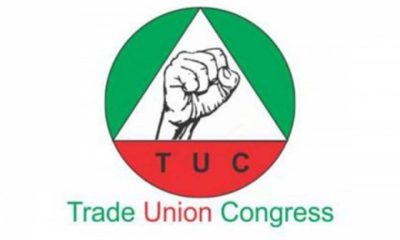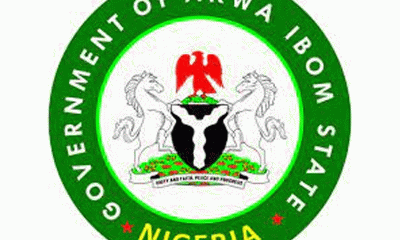BUSINESS
Sanwo-Olu Woos Investors to Lagos, Says ‘We Have Sufficient Land’

By Joseph Amah, Abuja
Governor of Lagos, Babajide Sanwo-Olu,says the state is “ready” to absorb investors from all parts of the country. The governor said Lagos has sufficient land to accommodate more investment opportunities. He spoke on Tuesday at the inauguration of the Dangote Fertiliser Plant — the largest in Africa and second-largest in the world.
President Muhammadu Buhari had earlier inaugurated the three million metric tonnes plant situated in Ibeju Lekki.
Sanwo-Olu said it was pertinent to replicate the strides of Aliko Dangote across the country. “How do we ensure that indeed, we put other Aliko Dangotes in other parts of this country and they can domesticate all of these great initiatives,” he said.“So, the story is not about him today, it’s about all of us. How many others do you want to build? Lagos is home and is ready. “We’re ready for business, Lagos is open for investment. We have sufficient land for you. Don’t think that it’s Kebbi, Kaduna that have land. We have sufficient land for you to absorb all of your investments that you might be thinking about.”
The governor said the state will be inaugurating the largest rice mill in the country in the next two months. He said the rice mill and the fertiliser plant will improve job creation and empower farmers across the country.
BUSINESS
Nigeria Requires $120bn to Build Federal Roads – TUC

The Trade Union Congress of Nigeria has stated that the country would need an estimated $120bn to construct its federal road network, a sum that is roughly four times the size of its annual budget.
The union described the gap between Nigeria’s infrastructure needs and available resources as alarming, accusing much of the political leadership of lacking the vision and innovation required to revive the economy.
Speaking at the second edition of the TUC South-West Summit 2025 in Lagos, TUC President-General Festus Osifo cited a 2013 study that put the cost of constructing all federal roads at $120bn.
He noted that Nigeria’s current budget, which stands between $30bn and $35bn, is already heavily committed to salaries, education, healthcare, defence, and other essential services.
“If constructing all our roads will cost $120bn, and the size of our budget is $30bn, it means we need four times our budget just to fix roads, without paying salaries, funding education, or providing healthcare,” Osifo told delegates. “This is why we must grow our revenue base and stop pretending that oil alone can sustain this country.”
He criticised successive governments for failing to diversify the economy in any meaningful way despite Nigeria’s vast opportunities in agriculture and solid minerals. According to him, the chronic underfunding of infrastructure is not only due to low revenue generation but also stems from weak political leadership.
“Most of our political heads, from governors to local government chairmen, are relatively lazy. In some rural councils, you will not see the chairman until allocations arrive,” Osifo said. “We cannot continue with leaders who wait for monthly allocations before doing anything. They must think beyond the obvious and work for the people.”
He contrasted Nigeria’s performance with that of countries with smaller landmasses and fewer natural resources, which earn more from agriculture than Nigeria currently generates from oil exports. “We have arable land, we have human capital, yet we leave them idle while relying on a single commodity that the world is steadily moving away from,” he added.
Representing Lagos State Governor Babajide Sanwo-Olu, Commissioner for Establishments and Training Afolabi Ayantayo acknowledged the validity of the TUC President’s concerns. He called for stronger partnerships between government and organised labour, noting that Nigeria’s diplomatic missions abroad were underutilised and often failed to secure export markets for local produce and manufactured goods.
“Collaboration is key. We must invest in skills development, fair wages, and policies that address inflation and the rising cost of living,” Mr Ayantayo said. “In Lagos, we are committed to workers’ welfare and timely salary payments, but we also recognise the need to push productivity and innovation.”
The summit, themed Collaborate to Transform: Building Capacity for Regional Excellence and Workers’ Welfare, gathered labour leaders, government representatives, and private sector experts to discuss strategies for driving economic growth in the South-West. Panel sessions explored topics such as agriculture, leadership, communication, emotional intelligence, and the role of artificial intelligence in the workplace.
In his closing remarks, Osifo reiterated that unless Nigeria’s leaders adopt more proactive and resourceful approaches, the country will remain trapped in a cycle of inadequate budgets, deteriorating infrastructure, and wasted opportunities.
“The $120bn needed to fix our roads is not just a number but a reflection of how far behind we are. Only bold and innovative leadership can bridge that gap,” he concluded.
| ReplyReply allForwardAdd reaction |
BUSINESS
Nigeria Customs Set to Review License Rates of Agents

By Tony Obiechina Abuja
The Nigeria Customs Service (NCS) said it has commenced consultations with stakeholders on planned review of licensing renewal fees for Licensed Customs Agents.
This was disclosed during a high-level stakeholders’ engagement with executives of the Association of Nigerian Licensed Customs Agents (ANLCA), the National Association of Government Approved Freight Forwarders (NAGAFF), the Africa Association of Professional Freight Forwarders and Logistics of Nigeria (APFFLON), and Customs Consultative Committee (CCC), held at the NCS Headquarters recently in Abuja.
In a statement by NCS spokesman, Abdullahi Maiwada on Sunday, the meeting marked the first in a series of consultation sessions to be held with industry players ahead of the planned implementation.
The licensing of Customs Agents remains a critical component in safeguarding the integrity of Nigeria’s cargo clearance process. The planned review is intended to reflect prevailing economic realities, including the value of exchange rates, address operational demands, and ensure that only agents who meet the Service’s compliance, competence, and integrity requirements continue to operate within the system.
The initiative is aimed at promoting accountability, streamlining processes, and enhancing the quality of service delivery in the sector.
The Service emphasised that the review forms part of broader modernisation efforts targeted at repositioning the NCS to meet the evolving needs of international trade and border management. It is expected to create a more transparent, predictable, and efficient licensing regime that will ultimately benefit legitimate operators and the trading public.
The new licensing structure is scheduled to take effect from January 2026, following the conclusion of stakeholder consultations.
Furthermore, Licensed Customs Agents who comply with the new licensing structure will enjoy access to premium facilitation measures, including faster processing timelines, improved engagement channels with Customs officers, and enhanced integration with the Service’s upgraded digital platforms.
This compliance-driven incentive is designed to encourage adherence to professional standards while discouraging sharp practices.
The NCS reassures stakeholders of its commitment to an inclusive process and notes that feedback from industry associations, individual operators, and relevant government agencies will be carefully considered before the finalisation and implementation of the review. The Service also reiterates its dedication to fairness, transparency, and the promotion of a secure, competitive, and efficient trading environment in Nigeria.
BUSINESS
Nigeria Exports 663m Metric Tonnes of Products within ECOWAS in Six Months

The Nigeria Export Promotion Council (NEPC), said Nigeria exported products worth 663 million metric tonnes to 11 ECOWAS countries in the first half year of 2025.
The Director-General of the NEPC, Nonye Ayeni, made this known to newsmen, while presenting a report on first half of 2025 Non-Oil Export Performance, in Abuja on Sunday.
Ayeni said that the figure showed an increase in exported products as against the same period in 2024.
“In the same vein, Nigeria exported 488 million metric tonnes of products worth 83.538 million dollars to 21 African countries outside ECOWAS.
“This is reflecting an increase of 2.59 per cent of the total export value as compared to 1.
96 per cent for the same period of 2024.“It also lends credence to the fact that the African Continental Free Trade Area (AfCFTA) holds the key to intra-African trade.
“Indeed, Nigeria’s active participation in the AfCFTA is a testament to the significant opportunity it offers to exporting companies, also Small Medium Enterprises (SMEs),” she said.
Ayeni said that the effort would help to boost regional trade and drive economic growth across the African continent.
She, therefore, commended the Ministry of Industry, Trade and Investment, on its commitment in ensuring that Nigeria becomes a hub and a major player in economic development.
She said of the top 20 leading export companies, Indorama Eleme Fertiliser and Chemical Ltd and Starlink Global and Ideal Ltd, maintained their position as the first and second.
According to her, the companies maintained their position with 11.92 per cent and 8.82 per cent, respectively.
She said that in the period under review, a total of 29 banks participated in processing export transactions.
“A total of 10,214 Nigeria Export Proceed Forms (NXPs) were opened through these banks for non-oil exports with Zenith Bank Plc leading the pack with 31.98 per cent of the total NXPs for non-oil export.
“While First Bank Nigeria Plc and Guaranty Trust Bank Plc came second and third, with 12.44 per cent and 11.47 per cent, respectively,” she said.
The director-general said that a total of 18 exit points were used in exporting non-oil products from Nigeria during the period under review.
She said that the exit points included eight seaports, three international airports and seven land borders, adding that 94.15 per cent of the total non-oil exports were routed through seaports.
The NEPC boss said that in the period under review, the council organised over 252 capacity building programmes, with a total of 27,352 participants across the country.
She said that the training focused on documentation and procedures and export readiness.
“We also carried out training in the area of Good Agricultural Practices (GAP), Good Warehousing Practice (GWP), Good Manufacturing Practice (GMP), packaging and labelling, among others”.
| ReplyReply allForwardAdd reaction |





























